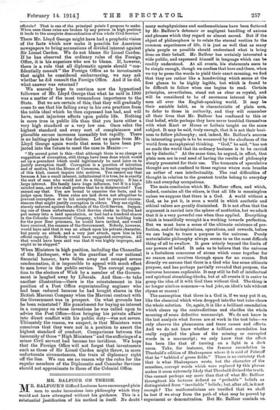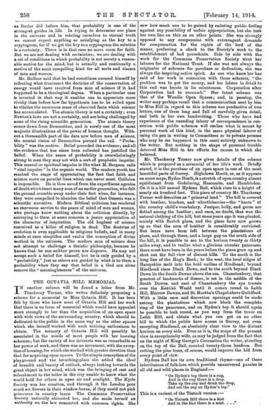MR. BALFOUR ON THEISM.
MR. BALFOUR'S Gifford Lectures have encouraged plain men to make incursions into philosophy which they would not have attempted without his guidance. This is a substantial justification of his method in itself. No doubt many metaphysicians and mathematicians have been fluttered by Mr. Balfour's debonair or negligent handling of axioms and phrases which they regard as almost mired. But if the object of philosophers is to relate the eternal verities to the common experiences of life, it is just as well that as many plain people as possible should understand what is being done on their behalf. Mr. Balfour has certainly interested a wide public, and expressed himself in language which can be readily understood. At all events, his statements seem to be simple enough, though we confess that here and there, when we try to press the words to yield their exact meaning, we find that they are rather like a handwriting which seems at the first glance to be highly legible, but which is found to be difficult to follow when one begins to read. Certain principles, nevertheless, stand out as clear as crystal, and will be considered to be of enormous interest by plain men all over the English-speaking world. It may be their amiable habit, as is characteristic of plain men. to defer to those in authority, and they will remember all their lives that Mr. Balfour has confessed to this or that belief, while perhaps they have never troubled themselves with what Kant or Hume or Leibniz taught on the same subject. It may be said, truly enough, that it is not their busi- ness to follow philosophy; and, indeed, Mr. Balfour's success in interesting people is to be measured by the aloofness of the world from metaphysical thinking. "God," he said, "has not so made the world that its ordinary business is to be carried on by dialectic." At the same time, he argued, in effect, that plain men are in real need of having the results of philosophy simply presented for their use. The torments of speculative thought are not confined to those regions where men breathe an aether of rare intellectuality. The real difficulties of thought in relation to the greatest truths belong to everyday life and everyday occupations.
The main conclusion which Mr. Balfour offers, and which. indeed, contains all the others, is that all life is meaningless unless we suppose that there is a God. A world without a God, as he put it, is even a world in which aesthetic and ethical values are greatly diminished. It is not often that the argument is carried into the sphere of aesthetics, but we admit that it is a very powerful one when thus applied. Everything which is beautifully wrought is a working towards perfection. But we must have a sense of the ultimate existence of per- fection, and of its inspirations, operations, and rewards, before we can begin to trace a purpose in the universe. Purely materialistic philosophy always seems to us the most difficult thing of all to swallow. It goes utterly beyond the limits of our powers of belief. It asks us to believe that the universe is a fortuitous concourse of atoms which came together for no reason and revolves through space for no reason. But directly we assume that there is a God who has some ultimate purpose, and has perhaps partially revealed that purpose, the universe becomes explicable. It may still be full of intellectual and spiritual stumbling-blocks, but at all events it is easier to grasp the idea of it with God than without God. The thing is no longer aimless nonsense—a bad joke, an idiot's tale without rhyme or reason The assumption that there is a God is, if we may put it so, like the chemical which when dropped into the teat tube clears the whole solution. Or, again, it is like a brilliant emendation which clears up the contradictions and clarifies the whole meaning of some defective manuscript. We do not know in the haat analysis what forces are at work in the test tube—we only observe the phenomena and trace causes and effects. And we do not know whether a brilliant emendation has really supplied the place of the missing or corrupted words in a manuscript; we only know that the effect has been like that of turning on a light in a dark room. Take, for instance, the famous emendation in Theobald's edition of Shakespeare where it is said of Falstaff that he " babbled o' green fields." There is no certainty that that is what Shakespeare wrote, but the character of the senseless, corrupt words which were replaced by this phrase makes it seem extremely likely that Theobald divined the truth. One cannot perhaps say more than that of what Mr. Balfour throughout his lectures defined as " probable " beliefs as distinguished from " inevitable " beliefs; but, after all, is it not enough P The mathematicians are terrified that we shall be lost if we stray from the path of what may be proved by experiment or demonstration. But Mr. Balfour reminds us,
as Butler did before him, that probability is one of the strongest guides in life. In trying to determine our place in the universe and in relating ourselves to eternal truth we cannot expect anything so satisfying as the key to a cryptogram, for if we get the key t,o a cryptogram the solution is a certainty. There is in that case no more room for faith. But we are not dealing with certainties ; we are dealing with a set of conditions in which probability is not merely a reason. able motive for the mind, but is actually and continually a motive of the most compelling kind for all sorts and classes of men and women.
Mr. Balfour said that he had sometimes amused himself by reflecting what treatment the doctrine of the conservation of energy would have received from men of science if it had happened to be a theological dogma. When a particular case is inverted in that way it enables one to appreciate more vividly than before how far hypothesis has to be relied upon to vitalize the enormous mass of observed facts which science Las accumulated. The atomic theory is not a certainty ; even Newton's laws are not a certainty, and are being challenged by some of the rising scientific generation. The atomic theory comes down from Democritns, and is surely one of the most majestic illustrations of the power of human thought. With- out a thousandth part of the data now before men of science, the mental vision of Democritus pierced the veil. "Proba- bility" was the motive. Belief preceded the evidence ; and all the evidence that baa since been collected has justified the belief. When the sense of probability is overwhelmingly strong in men they may act with a sort of prophetic impulse. This mental or spiritual impulse is like what M. Bergson calls "vital impulse" in the organic world. The modern youth has reached the stage of appreciating the fact that faith and science move on parallel lines which can never meet. Collision is impossible. He is thus saved from the superfluous agonies of doubt which beset many men of an earlier generation, who felt the ground crumble away under their feet when, for instance, they were compelled to abandon the belief that Genesis was a scientific narrative. Modern Biblical criticism has rendered an enormous service to the peace of mind of men and women, who perhaps know nothing about the criticism directly, by conveying to them at some removes a jester appreciation of the character of inspiration. The old bugbear of science conceived as a killer of religion is dead. The doctrine of evolution is even applicable to religions beliefs, and in many minds at once simplifies and exalts the conception of divine method in the universe. The modern man of science does not attempt to challenge a theistic philosophy, because he knows that he can neither prove nor disprove. He may not accept such a belief for himself, but he is only guided by a " probability," just as others are guided by what is to them a probability when they say that belief in a God can alone remove the "meaninglessness" of the universe.







































 Previous page
Previous page